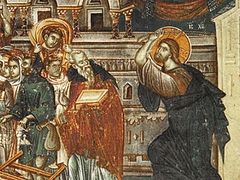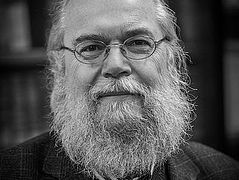The second Sunday of Great Lent is called the “Week of Light-Creating Fasts”.
The Church celebrates the memory of Holy Hierarch Gregory Palamas, a great theologian of the fourteenth century, the “preacher of grace” as we sing of him in his troparion. St. Gregory taught about the Uncreated Taboric divine light of the Transfiguration, which never begins and never ends, but always abides where there is the Lord, in His Church. And we are called to be witnesses to this light. We can behold this light, partaking of it as Christ’s gift, according to the measure of our hearts’ purity.
When Christianity loses its ancient name, is no longer dangerous to anyone, then its enemies open or hidden will turn their admiring gaze toward the times of its former glory. No longer frightened by the scorching love of a heart filled with grace, they will spare no amount of praise for monastic activity, the incomparable beauty of the divine services, church homilies, and the perfection of the Church’s philosophy. This, they will say, was a great moment in our civilization. They will recognize its ability to penetrate the depths of the human spirit. In reverent tones mingled with sadness they will discuss its moral and cultural values—emphasizing that despite all its negative qualities, its unnecessary dogmatism and elements of fanaticism, it helped mankind grow and develop. Having gradually lost its futile yearning for the heavens, it was finally able to embody itself in the earthly. However, they will add, just like everything else in the world, in the end it exhausted itself. Then in beautiful churches hung with masterpieces of iconography, ancient Byzantine chants will waft from speakers, and utensils for the Eucharist—precious museum objects—will be on display to the curious crowds.
As one theologian said, when Christianity no longer hinders anyone it will finally be fairly assessed, and this will be in the manner of a gravesite eulogy. And then will ensue the total triumph of sin and death. Because of the increase in lawlessness love will cool; salt will no longer be salty, the sun will dim and the moon will no longer give its light.
We can see that our enemies’ intentions are serious. Therefore during the fast we are not simply seeking comfort amidst unbearable sorrows, but the Comforter, Spirit of Truth Himself. St. Ignatius (Brianchaninov) prayed for his friend: “Lord, give Leonid spiritual consolation, so that his faith would be alive and heartfelt, and not just the hearing of words!” St. Silhouan the Athonite also prayed this way for all people.
But Optina Elder Nektarius, who often repeated, “How can I be the successor of the former elders! They had whole loaves of grace, while I have but a slice”, in answer to a question from one of his admirers as to whether it is true that all the signs of the Second Coming have already come to pass, said: “No, not all. But of course, anyone can see at first glance—and it’s especially clear to spiritual eyes—that if earlier the Church was a broad circle spread across the entire horizon, now it’s like a little ring. But in the last days before the coming of Christ, the whole of it will be preserved in this form: one Orthodox bishop, one Orthodox priest, and one Orthodox layperson. I am not saying that there will be no churches—there will be. But Orthodoxy will be preserved only in that form.” “Pay attention to these words,” he added, “and understand. For this applies to the whole world.”
Of course Elder Nektarius probably did not mean that there will literally be one bishop, one priest, and one layperson—but that as long as there will be at least one person who is authentically seeking salvation, for his sake alone the Lord will not withdraw His grace. And such temptations are coming that without especial grace no one, not a single person can stand firm in truth and love.
This is what today’s feast is telling us about. Amidst the triumph of lies, every Christian should be a theologian—someone who can say a word about God—not because he knows about Christ, but because he knows Christ. As Christ Himself says, “I know My sheep, and am known of Mine” (cf. Jn. 10:14). Thus, we need to go through the Fast, so that at its end we can sing together with the Church, “Having beheld the Resurrection of Christ”. Like the apostles about whom we have heard in the Gospels at the All-Night Vigil, we ourselves must touch His wounds and His Resurrection, because it is impossible to go on living without this. We must be able to tell others not only that we heard, but that we saw with our own eyes what we felt with our own hands—the Word of Life—for Life has manifested Itself to us. We become theologians through fasting and prayer. Theology is the continuation of prayer (it should be one and the same language—the language by which people speak to God) and the continuation of fasting, as a responsible giving of ourselves in soul and body to Christ God. We all remember these words: “If you are a theologian, you pray purely; and if you pray purely, you are a theologian.”
Here are the dangers that surround us. First there is purely human wisdom, which considers the demands of life in the Spirit foolishness, and then comes the dissolution of consciousness and destruction of everything. St. Theophan the Recluse said that atheism is not criminal right off the bat, but is at first a sort of acceding to the existence of a “higher reason”. But our God is more than a “higher reason”. He is the Father, Who loves, and the Son, Who was crucified and victorious over death, and the Holy Spirit, illumining every man that comes into the world.
It is the time of fasting and prayer. Stand to the death, O Christian! Be ready to pay with your own blood for even one drop of grace, bought at a precious price. We must hinder them, not allow them to win, restrain the evil—be “the one who restrains”.1 We must be those who are in fact participants in God’s fortress—the grace of the Holy Spirit—and shut the lips of corruption and lies that have already opened to pronounce final sentence against the Church.




